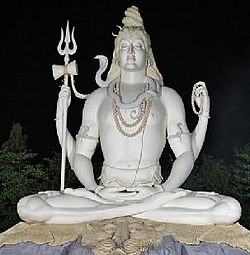| Kaivalya Upanishad | |
|---|---|
 The supreme God is Shiva, Shiva is Brahman, Brahman is Atman, Know your Atman, Know yourself to be that Brahman, states the Kaivalya Upanishad[1] | |
| Devanagari | कैवल्य |
| IAST | kaivalya |
| Title means | Aloneness,[2] Absoluteness[3] |
| Type | Shaiva |
| Linked Veda | Yajurveda |
| Chapters | 1 |
| Verses | 26 |
| Philosophy | Vedanta[2] |
| Part of a series on |
| Shaivism |
|---|
 |
|
|
The Kaivalya Upanishad (Sanskrit: कैवल्य उपनिषद्) is an ancient Sanskrit text and one of the minor Upanishads of Hinduism. It is classified as a Shaiva Upanishad, and survives into modern times in two versions, one attached to the Krishna Yajurveda and other attached to the Atharvaveda. It is, as an Upanishad, a part of the corpus of Vedanta literature collection that presents the philosophical concepts of Hinduism.
The Upanishad extols Shiva, aloneness and renunciation, describes the inner state of man in his personal spiritual journey detached from the world. The text is notable for presenting Shaivism in Vedanta, discussing Atman (Self) and its relation to Brahman, and Self-knowledge as the path to kaivalya (liberation).
The text, states Paul Deussen – a German Indologist and professor of philosophy — is particularly beautiful in the way it describes the self-realized man who "feels himself only as of the one divine essence that lives in all", who feels identity of his and everyone's consciousness with God (Shiva, highest Atman), who has found this highest Atman within, in the depths of his heart.
- ^ Deussen 1997, pp. 791–795.
- ^ a b Cush 2007, p. 397.
- ^ Deussen 1997, p. 791.